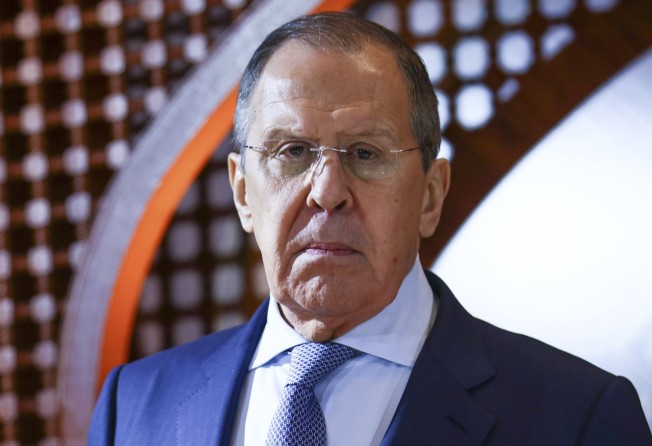
Xi Jinping calls for more trust, security cooperation in BRICS talks
- Chinese president tells foreign ministers – including Sergey Lavrov of Russia – the nations should coordinate on key issues and respect each other’s sovereignty
- It was the first such BRICS meeting since Russia invaded Ukraine; three members earlier abstained from voting on a UN resolution to condemn Moscow

China’s president has called for stronger political trust and security cooperation with the other BRICS emerging economies during virtual talks on Thursday.
Xi Jinping told the meeting that the five nations – Brazil, Russia, India, China and South Africa – should coordinate closely on major international and regional issues, take care of each other’s core interests and concerns, and respect each other’s sovereignty, security and development interests.
“The BRICS should … oppose hegemonism and power politics, resist Cold War thinking and bloc confrontation, and build a community with shared security for mankind together,” Xi said, according to Chinese state news agency Xinhua.
He was addressing a meeting of foreign ministers that included Sergey Lavrov of Russia – the first such BRICS talks since Moscow invaded Ukraine in February. Notably, three of the BRICS members – China, India and South Africa – earlier abstained from voting on a United Nations resolution to condemn Russia for its aggression against Ukraine.

Despite its calls for dialogue and a peaceful solution to the Ukraine crisis, China has been under pressure from the West over its close ties with Russia and its opposition to sanctions. Russian pipeline natural gas sales to China reportedly went up 60 per cent in the first four months of the year.
And as Russia’s war in Ukraine has united the West around the US and Nato, Beijing – seeking to avoid isolation – has sought to rally support among developing nations. In March, Chinese Foreign Minister Wang Yi gathered top diplomats from Algeria, Egypt, Pakistan, Saudi Arabia, Tanzania and Zambia to voice support for China’s stand on Ukraine and oppose sanctions against Russia. Many of those countries had also abstained from the UN vote condemning Russia – which 141 nations voted in favour of.
In his speech, Xi again stated China’s position that the pursuit of one country’s security at the expense of others’ will only create new contradictions and risks.
“In the face of the current risks and challenges, it is more important than anytime ever to strengthen solidarity and cooperation between emerging-market countries and developing countries,” he was quoted as saying.
He also called for more engagement, dialogue and exchanges with other emerging-market and developing nations, and to improve understanding and mutual trust and strengthen cooperation.
The videoconference was chaired by Chinese Foreign Minister Wang and also attended by Naledi Pandor of South Africa, Carlos Franca of Brazil and India’s Subrahmanyam Jaishankar.